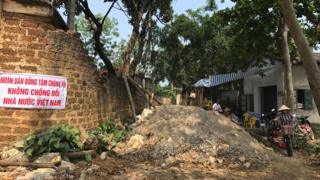 Image copyright
Image copyright
AFP
Villagers have blocked roads during the week-long stand-off
Residents of a village outside Hanoi are holding policemen and officials hostage in a week-long stand-off over a land dispute.
Local authorities have fled and residents now control the village. They have built barricades to keep police out and the situation is very tense, as the BBC’s Vietnamese Service explains.
How did the dispute start?
Dong Tam Commune, 40km (25 miles) from the centre of Vietnam’s capital, has been in the national spotlight since last Saturday, when local residents took 38 people captive to protest over a land dispute.
The land in question is a 50-hectare (124 acres) area the defence ministry allocated to the military-run communications firm Viettel Group in 2015. The local authorities say it is for a defence project and that protests only began this year. But local residents say they vehemently opposed the land requisition as they were given inadequate compensation.
Reports suggest tensions had been rising for months, as Viettel started clearing the land ahead of construction and residents tried to obstruct its efforts.
As tensions escalated in March, Hanoi police opened an investigation into the residents for “disturbing social order”.
Matters came to a head on 15 April, when police arrested four people. Local villagers retaliated by surrounding and seizing 38 officials, including police officers.
Image copyright
EPA
Villagers initially seized 38 people but that number has now fallen to 19
How is the government handling it?
Disputes over land rights are common in Vietnam because the communist government does not recognise private land ownership. Government agencies reserve the right to seize farmland for construction and investment projects. But it is rare for protesters to seize such a large number of officials.
So far the government has shown restraint, sending the Hanoi city chief to the area. Nguyen Duc Chung has promised to launch an investigation which will conclude in 45 days.
Over the past week, the number of hostages has fallen to 19. After the police released the four villagers, 15 members of a riot police unit were freed by villagers while three others escaped. One more was freed on Friday. But 19 people still remain captive, even after Mr Chung came to the area and offered to meet the protesters.
So far, there have not been any reports of those detained being treated violently. But the villagers say they will not let them go until a deal over the land is reached. They say they have lost faith in local authorities and want to talk to senior officials.
Taking the battle online
The story has received limited coverage in state-run media, but more reports have been published since Thursday when Mr Chung visited the area. The media have tended to avoid discussing the cause of the dispute. Instead two articles said there were “signs of legal violations by the villagers” and hinted that “everything has its limits”.
Social media – Facebook and YouTube – have played an important role in this particular protest, however.
The villagers have filmed videos to post on Facebook when connectivity was not disrupted, while their Hanoi-based relatives have done Facebook Lives to publicise the situation. In response, government media such as Voice of Vietnam published a video briefing of Mr Chung on their websites to demonstrate his willingness to hold dialogue.
Facebook, which has about 35 million users in Vietnam, has quickly become a battleground for pro-government social media users and Vietnamese activists to argue about the stand-off.
Image copyright
EPA
Villagers say they no longer trust local officials
Can the dispute be resolved?
The Dong Tam crisis is just one of many protests over land use each year.
According to a law approved in late 2014, land can only be taken if it is deemed necessary for socio-economic development that is in the public or national interest. However, “socio-economic development” is loosely defined and vulnerable to abuse and corruption.
In the Dong Tam case, the villagers argue that the land requisition is not for military purposes and thus they should be compensated better.
A protester told BBC Vietnamese: “We only wish to talk with people from the central government. If the prime minister decides to reclaim the land, we will oblige but there must be proper compensation.”
Looking long-term, respected economist Vu Thanh Tu Anh at Fulbright University in Ho Chi Minh City said the current dispute was “a consequence of serious ongoing mistakes in the land policy” which can only be solved with a thorough review of “land ownership, people’s property rights and the local government’s right to reclaim land” in Vietnam.
Meanwhile, all eyes remain on Dong Tam village and how the stand-off there will play out.
Why Vietnamese villagers are holding police hostage}

